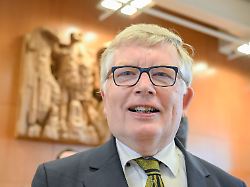“Decides on chancellorship”
Economist Scholz commits to debt brake
November 28, 2023, 3:16 a.m
Listen to article
This audio version was artificially generated. More info | Send feedback
Almost two weeks after the ruling from Karlsruhe, the traffic light is still having a hard time with the savings proposals. The former economist Wieland demands clear priorities from the Chancellor. His office depends on that. The economist is very harsh on the Greens’ climate subsidies.
Former economist Volker Wieland has called on the federal government to step up austerity efforts and stick to the debt brake. Now Chancellor Olaf Scholz must “commit the coalition to priorities. By the way, that is the purpose of the debt brake, that is what it was created for,” said the professor of monetary economics at the University of Frankfurt to the “Bild” newspaper. Wieland added that his chancellorship will probably decide on the question.
The federal government “can certainly slim down without immediately endangering Germany’s future, as is currently being hastily claimed for almost all federal spending items,” Wieland continued. “The excessively high billion-dollar subsidies to Intel and Co. need to be examined,” demanded the former economist. “The money is better spent by relieving the burden on the economy as a whole, as with the Growth Opportunities Act.” Less money is earmarked for this than goes to Intel in subsidies. Citizens’ money needs to be “reviewed and overhauled,” he added.
“Climate policy must be reset”
Wieland sharply criticized the federal government’s climate policy. This needs to be “reset”. “The Greens in particular did not want to rely on the CO2 price, but rather distributed generous subsidies to individual companies,” said Wieland. In this way you can make yourself popular with company managers. But don’t wear that. “Without increasing the CO2 price, the transformation remains a permanent subsidy. On the other hand, emissions certificate trading in the building and mobility sectors could provide higher income. This can be used to pay for investments in climate-protecting technologies as well as climate money for those in need.”
Instead, the traffic light wants to finance it with debt, which the future generation will then have to pay for. This is unfair because the emissions are caused by current generations and the debt will be distributed among fewer shoulders in the future due to the shrinking population, explained Wieland.
In mid-November, the Federal Constitutional Court declared it inadmissible to finance important expenses of the traffic light coalition through special funds in addition to the regular budget. The government must therefore now present a supplementary budget for 2023 and suspend the debt brake for the fourth time in a row.
